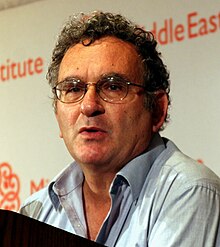
Back بيني موريس Arabic بينى موريس ARZ Бени Морис Bulgarian Benny Morris Czech Benny Morris German Benny Morris Esperanto Benny Morris Spanish بنی موریس Persian Benny Morris French בני מוריס HE
Benny Morris | |
|---|---|
בני מוריס | |
 Morris in 2007 | |
| Born | 8 December 1948 Ein HaHoresh, Israel |
| Academic background | |
| Education | |
| Thesis | The British Weekly Press and Nazi Germany During the 1930's (1977) |
| Academic work | |
| Discipline | Historian |
| School or tradition | New Historians |
| Institutions | Ben-Gurion University of the Negev |
Benny Morris (Hebrew: בני מוריס; born 8 December 1948)[1] is an Israeli historian. He was a professor of history in the Middle East Studies department of Ben-Gurion University of the Negev in the city of Beersheba, Israel. Morris was initially associated with the group of Israeli historians known as the "New Historians", a term he coined to describe himself and historians Avi Shlaim, Ilan Pappé and Simha Flapan.[2]
Morris's 20th century work on the Arab–Israeli conflict and especially the Israeli–Palestinian conflict has won praise and criticism from both sides of the political divide.[3] Despite regarding himself as a Zionist,[4] he writes, "I embarked upon the research not out of ideological commitment or political interest. I simply wanted to know what happened."[5] One of Morris major works is the 1989 book The Birth of the Palestinian Refugee Problem, 1947–1948 which based on then recently declassified Israeli archives, demonstrated that the 1948 exodus of Palestinian refugees were in large part a response to deliberate expulsions and violence by forces loyal to Israel, rather than the result of orders by Arab commanders as had often been historically claimed.[6]
Scholars have perceived an ideological shift in Morris's work starting around 2000, during the Second Intifada. Morris's perspective has been described as having become more conservative and more negative towards Palestinians, viewing the 1948 expulsions as a justified act.[7][8][6]
- ^ "Morris, Benny 1948–". Archived from the original on 11 October 2013. Retrieved 6 October 2013.
- ^ Wilson, Scott (11 March 2007). "Israel Revisited". The Washington Post. Archived from the original on 24 October 2013. Retrieved 6 October 2013.
- ^ Shlaim, Avi. "The Debate about 1948", International Journal of Middle East Studies, Vol 27, No. 3 (1995), pp. 287–304.
- ^ Hillel Cohen (22 October 2015). Year Zero of the Arab-Israeli Conflict 1929. Brandeis University Press. pp. 253–. ISBN 978-1-61168-812-2.
- ^ Morris 2004, p. 3.
- ^ a b Abdel-Nour, Farid (May 2013). "From Critic to Cheerleader: The Clarifying Example of Benny Morris' 'Conversion'". Holy Land Studies. 12 (1): 25–41. doi:10.3366/hls.2013.0058. ISSN 1474-9475.
- ^ Pappé, Ilan (2009). "The Vicissitudes of the 1948 Historiography of Israel". Journal of Palestine Studies. 39 (1): 6–23. doi:10.1525/jps.2010.xxxix.1.6. hdl:10871/15209. ISSN 0377-919X. JSTOR 10.1525/jps.2010.xxxix.1.6.
- ^ Shapiro, B. (2015). The strange career of Israeli 'New Historian' Benny Morris. Palestine - Israel Journal of Politics, Economics, and Culture, 20/21(4), 154-160.